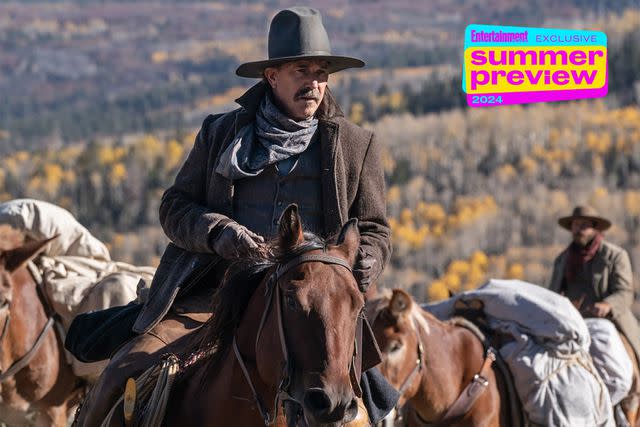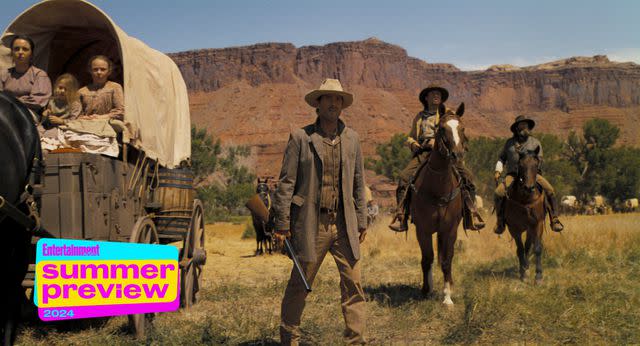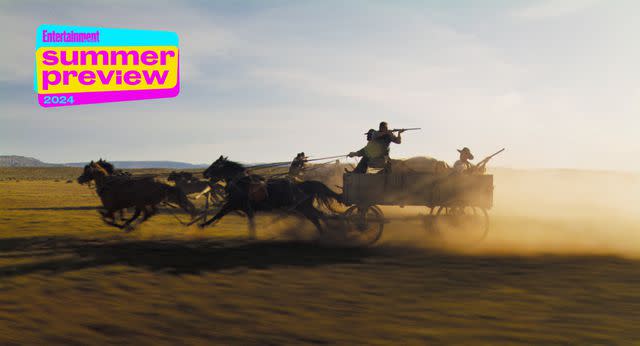Why making “Horizon” has long been Kevin Costner’s (manifest) destiny
Plus, why he'd compare a key speech in his new film to James Earl Jones' "Field of Dreams" baseball monologue.
The death of the Western has been greatly exaggerated.
The genre has been eulogized since at least the early 1950s, but while it may occasionally falter in popularity, it's never truly gone away. And this summer, Kevin Costner is ready (once again) to return it to its proper place in the American cinematic firmament with his four-part epic, Horizon: An American Saga.
Costner not only stars in the film, but he also returns to the director's chair for the first time since 2003's Open Range and co-wrote the script with Jon Baird.
The first two movies in the saga hit theaters on June 28 and Aug. 16, respectively, but Costner has been dreaming up the project since 1988. "I don't know if passion's the right word," he says of his dogged commitment to the films (though he may be selling himself short, considering that he named his son, Hayes, after the film's main character before it ever got made). "I just don't fall out of love with things I like. I am always looking for the next great movie."

Richard Foreman/Warner Bros.
Kevin Costner in 'Horizon: An American Saga - Chapter 1.'For him, the next great movie is often a Western. His first directorial effort, 1990's Dances With Wolves, won Best Picture at the Oscars. But his fascination with the American West began long before that and has never flagged. "There's real drama in how people crossed this country," Costner muses. "There's always this tendency to think it was a simpler time. It was infinitely more difficult. You were dealing with unknowns. You didn't know where you were going. You had to arbitrate your own problems… When you were confronted with issues, you had to make up your mind very quickly in very tough situations. Sometimes, life and death situations. Try that on a daily basis and see if you don't want to live with your computer and s---.
"If you search for stories," he continues, "you find incredible drama and realize that it's not a land in Disneyland. It’s not Frontierland. It was real stakes. And it was a 200 or 300-year struggle to cross this country."
In its original form, Horizon was not a four-part epic. It was titled Sidewinder and was more of a two-hander between Costner's character, Hayes, and another man. In contrast, Horizon follows a myriad of intersecting characters across 12 years. But make no mistake, Costner's Hayes is still central to that narrative.

Warner Bros. Pictures
'Horizon: An American Saga - Chapter 1'"He's illiterate and works his way across the country," Costner details. "I'd say college wasn't for him. He's just a man on a landscape, with all the possessions that he owns existing, on a horse. It's a romantic view of things, but I respond to that notion of having responsibility only to yourself. I don't have that, but I can look at it and go, 'Wow, wouldn't that be nice?'"
But lest you think the film is a white savior narrative about white men taming the Wild West, think again. Costner isn't interested in telling the story of Manifest Destiny without shining a light on its darker side and those often left out of the story.
"I don't want to be the person who's setting the record straight or 'Oh, here comes the history lesson.' That's not me," he explains. "But women are dominant in my film. I want to highlight what their contributions were. Without women, the West dies. It never happens. This country doesn't happen. They have a place in these stories."
There's also the film's view of Manifest Destiny and the atrocities perpetrated in its name. "You can't tell the story unless you bump into that," notes Costner. "You can't talk about anything without understanding who was here before us. Our national appetite ran over culture after culture, with a high level of genocide. The people that were here for thousands of years were suddenly an inconvenience in their own land, and we should never forget that. The conflict was unfair. It was one-sided. If it was a sporting event, somebody would've thrown the f---ing flag and said, 'This is unacceptable,' but we did it, and we did it across the whole country. I never am going to forget what our participation has been in settling America, and I'm not so embarrassed about it that I won't talk about it."

Warner Bros. Pictures
'Horizon: An American Saga - Chapter 1'In fact, the topic comes up in the movie's first trailer, which features a speech from Danny Huston's character about the impetus to move west. "These were people who were not going to have something big unless they took a chance, and America was that chance," Costner says of many of the film's characters. “[Moving west] was about hope. This speech bubbles out [of Danny] very much like James Earl Jones' talk about baseball [in Field of Dreams]. It's quite beautiful. Because people had hope in America, that's why so many people came. There was something to look forward to — if you were tough enough and smart enough and ruthless enough, you could hold onto something in America."
With Horizon, Costner examines the American West and all the contradictions, which, at its core, is what the Western has always been trying to do — interrogate the myths upon which our country was founded. "This is not a last stab at keeping this genre alive," he insists. "This genre will live forever if people take it seriously."
Want more movie news? Sign up for Entertainment Weekly's free newsletter to get the latest trailers, celebrity interviews, film reviews, and more.
Related content:
Kevin Costner's son Hayes makes acting debut in Horizon: An American Saga — watch the first trailer
Kevin Costner shares throwback photo from his first movie to 'honor this kid who had big dreams'
Read the original article on Entertainment Weekly.

 Yahoo Lifestyle
Yahoo Lifestyle 
